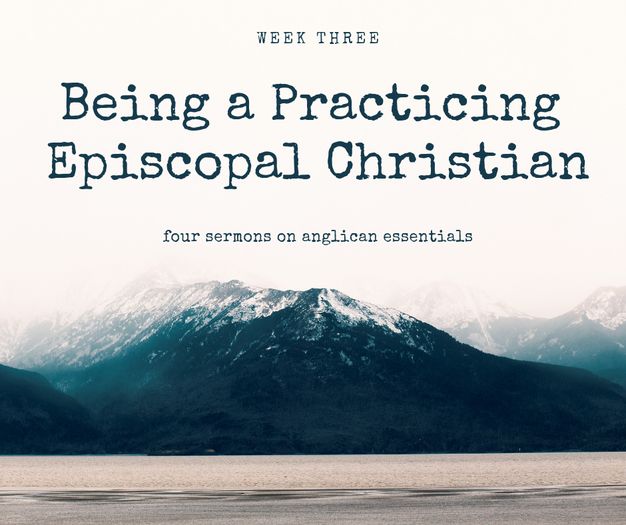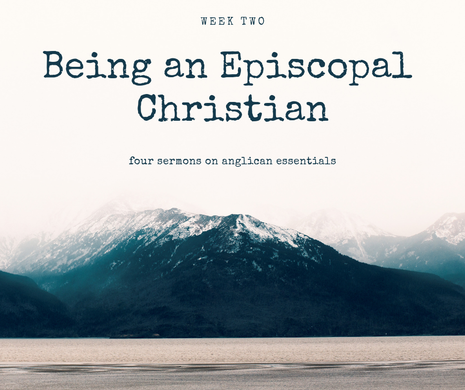|
“Not only with our lips but in our lives”.
Today we finish our series of sermons on Anglican Basics. My topic is “Being a practicing Episcopal Christian at Emmanuel”, taking what Mother Beth talked about over the last 3 weeks and putting it into practice, living it here in this place and within this group of people. Having worshiped in this particular Episcopal community for nearly 48 years it is hard to know where to begin, or perhaps more importantly where to end! It is just that I have so many stories from so many years. I look out on you from this pulpit and I see so many wonderful people, each of you trying your best to live out your faith, coming here week by week for renewal, for solace, for strength and then going back into your own part of the world to practice your faith. The thing is it’s not just you that I see from this pulpit; it is 48 years of people who have sat in these same pews and worshiped at this same altar. There are so many people who have called Emmanuel home. And it is the people who make each Eucharistic community unique.
0 Comments
 “Not only with our lips, but in our lives.” Today is the third in our series of sermons on Anglican essentials. You'll remember that we began by talking about being a Christian, then about choosing the Episcopal community as the one which will support you in your commitment to follow Christ. This sermon will talk about putting those choices into practice. The poet and essayist Kathleen Norris has written, "I firmly believe that the way we bathe a child or discuss family matters at the dinner table reveals who our God is." Not only does that reveal who someone’s God is, it reveals it more honestly than what we might say when asked to name our religious affiliation. In fact, in 2018 the pollsters over at the Pew Research Center created a whole new typology for classifying Americans spiritually, because the name of the religion we verbally claim to belong to is now almost worthless as an indication of what we actually believe and do. “The way we bathe a child or discuss family matters at the dinner table reveals who our God is." Those are the kind of things that show and shape where our pragmatic daily worship is directed. The word worship means ascribing ultimate worth to – prioritizing above everything else. So the easiest way to figure out who or what you have actually been worshiping, actually treating as most important, is to look at your schedule, your habits, your spending, and your preoccupations, day by day. There’s no shame in realizing that what you verbally claim as your religious faith hasn’t been coming first in your habits and behavior – this is exactly why we pray in the BCP that we “show forth God’s praise not only with our lips, but in our lives.” To be able to put God first, we need to ask help from God.  We talked last week about what it means to be a Christian, to let Jesus adopt you, acquit you, and apprentice you. And I mentioned that this is one of the bedrock choices of your life, which sets the course for how you will end up approaching any number of things. So whether or not you allow Jesus to adopt and acquit and apprentice you is an important decision. However, as we continue with the second week of this four week sermon series, and talk about being an Episcopal Christian, we'll see that it's also a generic choice, a choice that always ends up taking on some further shape, depending on the community you enter to flesh out your commitment to Christ. The Anglican writer C.S. Lewis has a great image of this. He says that becoming a Christian is like stepping into a hallway, out of which doors open onto several rooms. The choice to be a Christian is like coming inside and standing in that long hallway, but it's only a place from which to open the various doors and see which one seems the best fit for you. You can't just stay there; nobody lives in a hallway. If you want food and company and chairs to sit down on, you need to move into one of the rooms. So as important as it is to know whether or not you have gotten into the hallway, what we’ll talk about today in sermon #2 is simply what’s behind the Episcopal or Anglican door. All the rooms have their own style, so one of the ways I'll approach this is to contrast a few things you'll find in this room with things you'd find in a different one. By doing that I am not in any way criticizing people who feel called to a different room. I know I am called to this one, and in the way anyone who really loves something would say this, well, I just think it's the best. But we need to have an attitude of appreciation for our brothers and sisters whom God has called to do things differently, while also being, as Paul says, "thoroughly convinced in our own minds."  For the next month we’re going to focus in our sermons on spiritual basics, the kind of bedrock stuff where the actual energy for Christian living comes from. We did this three years ago as well, and like then, we’ll be having both this four part sermon series,and an instructed Eucharist. Today’s topic is being a Christian, and the next two are going to cover being an Episcopal Christian, being a practicing Episcopal Christian, and then finally being a practicing Episcopal Christian here at Emmanuel. Now these are not, of course, four options to pick and choose among. They’re a chain of developments. Being a Christian comes first, taking on the central identity God gives us... being an Episcopal Christian is choosing a community in which to live out that central identity...... practicing it is inviting God to shape your way of life to reflect your commitment… and doing it at Emmanuel is choosing which local group of Christians will support you and challenge you. |
Archives
July 2024
Categories |

 RSS Feed
RSS Feed